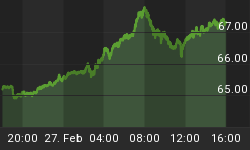Today, the Federal Reserve Open Market Committee (FOMC) announced it will continue to purchase government securities as previously announced ("QE2"), including reinvesting principal payments from its holdings.
The FOMC downgraded its economic growth forecast, acknowledged inflationary pressures have moved from commodity inflation to core inflation, yet insists inflation remains too low. The Fed considers inflationary pressures to be transitory, but monitors the evolution of inflation and inflation expectations.
We may need to revise the meaning not only of the word transitory, but also of what "inflation expectations are anchored" actually means. Forward looking inflation expectations as priced into the markets have moved up significantly since Fed Chairman's Bernanke Jackson Hole speech last August, when he lamented inflation was too low.
It appears to us that the headwinds caused by higher food and energy prices may be answered with more accommodating monetary policy given that the Fed confirms its accommodating policy may persist for an extended period. In that context, it should be noted that the phasing out of "QE2" is not an exit, but a pause. The banking system will remain awash in money as seen in the extreme levels of excess reserves. The trouble is that commodity inflation, and now core inflation, may well be fueled by the policies pursued in the first place.
Fed Chairman Bernanke argues that only equity prices rise because of his policies and that global demand and other factors are largely responsible for food and inflationary pressures. With due respect, while the Fed cannot be blamed for all the ills in the world, the Fed must not deny that it plays a role in fostering inflation, all the more since the Fed's explicitly stated policy is to raise inflation.
As the Fed continues to ease, as all other major central banks ex Japan are tightening, it would not be surprising should the U.S. dollar continue to weaken. It turns out that this may be exactly what Bernanke wants, as he is firmly embracing the dollar as a monetary policy tool.
When a central bank wants higher inflation, that wish is likely to come true. Bernanke has referred to the "slack in the economy" and high unemployment as to why inflation will remain contained. We hope he is right, but cannot base our investments on hope.















